 ★★★½
★★★½
“Sympathy for the devil.”
Alright, this needs some background first, so I’ll try my best to give the necessary information. Date a Bullet is a two-part spin-off movie from Date a Live. This was originally a light novel series, that became a manga and then an anime series. The last-named started in 2013 and is currently in its fourth season: it also previously got a pair of OVAs and one movie. This is the second film, though is essentially two episodes that were put together, and released in cinemas as a movie, despite a very short length of 50 minutes.
Date a Live was (and still is) as bonkers a basic premise as anime shows can be. A catastrophe 30 years ago causes spirits to appear in our world – until now, always in the form of beautiful girls. What are the odds? If the spirit is stressed or aggravated, she causes earthquakes and natural disasters. A little advice from me: how about the defense services NOT attack at the very first sight of such a spirit? Just an idea… A secret organisation protecting mankind from them has figured out a new way of dealing with these girls. The young, naive student Shido has to approach them, built up confidence and go on a date with them. When he kisses them he “seals in” their powers by doing so. This usually results in the spirit stopping being dangerous and moving into Shido’s home (where are his parents?). For the remainder of the episodes he is busy, trying to cope with school, the emotional needs of the girls and cooking for them all.
I guess there’s something that show wants to teach young Japanese men how to deal with girls. The whole secret organisation’s spaceship team (lead by Shido’s younger sister?) is trying to figure out the best of three responses for Shido when talking to the girls, and usually chooses the worst possible. Hilarity ensues. But somehow I couldn’t feel anything for Shido except for pity, dealing with all these girls wanting so many different things from him. It can’t be easy to be one of those beloved students in what we call nowadays a “harem anime”. There are plenty more of these where this comes from! The show is based on the idea of a so-called dating-app or game that helps train your dating skills before going into the wild, where untamed femininity can overwhelm an innocent, anxious Japanese boy. The idea is not the worst: I could have used such a tool when I was younger!
But this is a different beast, because it deals with the extraordinary character of Kurumi Tokisaki (Sanada), who is really different to all the other girls Shido met in the main show. Usually, meeting a girl spirit meant that, to cut a long story short, Shido would kiss the girl, or she, enchanted by Shido’s friendliness would kiss him – it has to be voluntarily. She’d join his harem, while they all crave his attention, everyone wanting a piece of him, his time, physical contact and so on. Not Kurumi. When she first appeared in the show, she seemed the girl spirit of this half-season, so to speak, but then quickly turned the tables.
 While the other girls might be complicated and have problems, like feeling unloved, being shy and, in one case, not even being into men, there always was a solution. Kurumi is… different: Shido soon found out she was there to sexually arouse him, so she could “eat him”. We can argue about the not-so subtle subtext: male Japanese anxiety about a sexually demanding and active woman. In the very same episode, some boys make sexually charged comments about her, she lures them into the shadows… next the blood is dripping from the walls.
While the other girls might be complicated and have problems, like feeling unloved, being shy and, in one case, not even being into men, there always was a solution. Kurumi is… different: Shido soon found out she was there to sexually arouse him, so she could “eat him”. We can argue about the not-so subtle subtext: male Japanese anxiety about a sexually demanding and active woman. In the very same episode, some boys make sexually charged comments about her, she lures them into the shadows… next the blood is dripping from the walls.
Yeah, cute-looking Kurumi in sexy red-black lingerie is a killer, a femme fatale and if I’m not mistaken (correct me if I’m wrong), falls into the popular category of the “yangires”, female psychotic anime characters that can go on a bloody rampage at the slightest provocation. She is the killer shark among Shido’s girl. But then, she never becomes part of his actual haremm because they never kissed. Innocent Shido would have been dead meat. There may be a hint of Kurumi being abused in her former life; it could just be me, trying to read between the lines.
In a show that follows the usual rules of harem anime, a character like this is almost a provocation, riding roughshod over those unwritten rules. Kurumi is a force to be reckoned with. Her left eye features the yellow dial of a clock: with her magical calling of “Zaphkiel”, an angel that can manipulate time and appears as a giant dial, she can actually turn time around. By shooting her gun into her own head she can replicate herself and create as many clones of herself as she wants. Magically she appears to be independent, she can appear wherever and whenever she wants.
For most of the show she has been the “punch clock villain”, someone you could expect to appear sooner or later in the show. Though she seems to soften her attitude to Shido, after her first encounters with Shido, where he unsuccessfully tried to reason with and find an emotional angle on her – that worked with the other spirits. In one episode, she goes on a date with him, only to be shot by a superior version of herself at the end, This clone was obviously trying to fulfill her supressed romantic desires. In a late season 3 episode, she even helped him travel back in time to prevent a catastrophe that would send one of his girlfriends on a later revenge trip against the other girl spirits.
Okay. On to Date a Bullet , which is exceptional in the Date a Live universe as it tells a story with Kurumi as the main character. There’s no Shido to be found here, none of the harem girls or supporting characters appear, It’s as if you took a bad Bond girl and gave her a solo movie. So, quite unusual! So, what’s the story? Kurumi finds herself in an alternate world where she is told she is in a battle royale. The winner gets a wish, and might even be able to return to her own world. As she is being told by a small girl who functions as comic relief, that the combatants are all “half-spirits”, Kurumi in her no non-sense manner declares her in quite clear terms that she considers herself a full spirit, not a half one. Then there is the character of the White Queen, an especially dangerous ghost she will sooner or later have to face.
The movie is well-made, though the DVD is definitely too expensive for just ran 50 minutes. It’s entertaining enough, though as expected, too short to build up much tension. But it also serves mainly to show that Kurumi has a heart, too. Flashbacks show a younger Kurumi when she was alive and in school with the one friend she had, Sawa Yamauchi, dreaming of how it will be when she will have a boyfriend. While you can easily guess who the White Queen is, Kurumi shows during the story how tough and no-nonsense she is. She is thankful for help, but this doesn’t mean she’s so naive as to trust you immediately. She has a softer side, too, saving a little cat that plays a special role in the story, and at the end seems to have found a pet that might accompany her in future. Though why she killed her best friend in the past, remains unanswered.
The film helped understand the character a bit better and gave her the limelight she deserves. I wouldn’t say we know everything about Kurumi Tokisaki now though. The character stays interesting and as Date a Live with its funny situations and cute/sexy girls is something of a guilty pleasure for me, I look forward for a dubbed version of season four, and discovering what kind of role Kurumi will play in it.
Dir: Jun Nakagawa
Star (voice): Asami Sanada. Asami Seto, Kaede Hondo, Mariya Ise






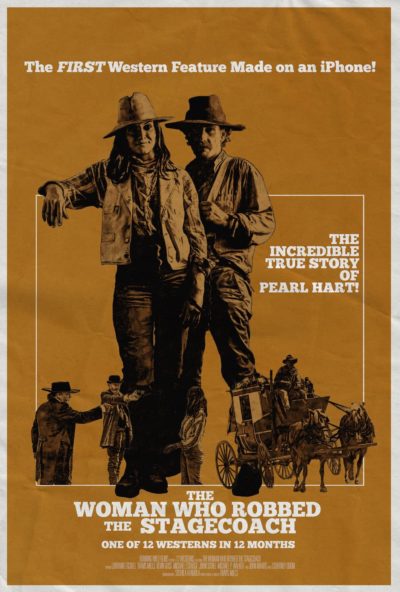 There are a couple of points to note going in. This was one of “12 Westerns in 12 months”, a project run by the director during 2020. It also proudly pronounces itself as the first ever Western feature to be shot entirely on an iPhone. Both of these do lead to limitations. The sheer speed involved obvious has an impact, and I can’t help wondering if a more measured approach would have been better for the end product. As for the iPhone… Well, on the plus side it looked perfectly watchable on my 49″ television, especially the outdoor scenes. However, the indoor sequences seemed almost
There are a couple of points to note going in. This was one of “12 Westerns in 12 months”, a project run by the director during 2020. It also proudly pronounces itself as the first ever Western feature to be shot entirely on an iPhone. Both of these do lead to limitations. The sheer speed involved obvious has an impact, and I can’t help wondering if a more measured approach would have been better for the end product. As for the iPhone… Well, on the plus side it looked perfectly watchable on my 49″ television, especially the outdoor scenes. However, the indoor sequences seemed almost 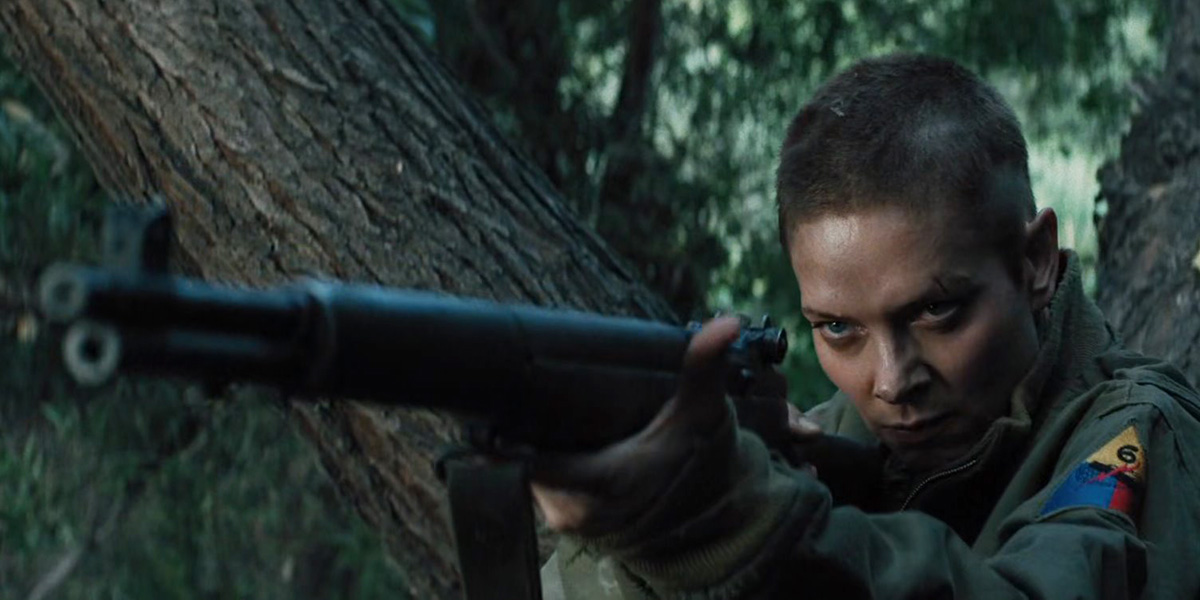 ★★★½
★★★½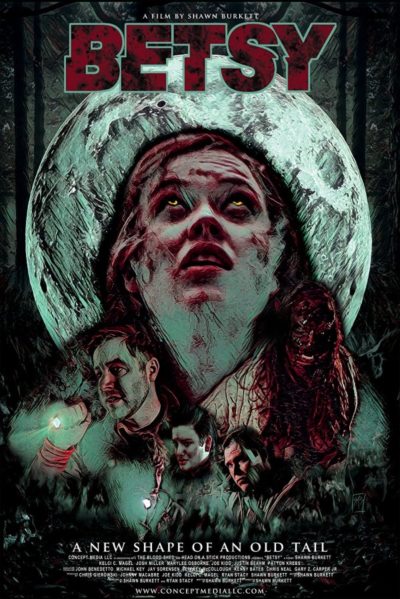 On her way home one night, Betsy (Ryan) is attacked by a mystery assailant and badly injured. While she recovers, she’s traumatized by the events, with nightmares that even her attendance at a support group can’t help. She is also increasingly plagued by violent outbursts against her supportive but increasingly concerned roommate Kayte (Osborne), and physical changes. If you are at all familiar with horror movies, you’ll know the symptoms: Betsy’s attacker was a werewolf, and she’s now in the process of becoming one. This throws a spanner in her growing relationship with Sam (Miller), made worse because he’s a policeman, investigating the recent spate of “animal attack” murders around town.
On her way home one night, Betsy (Ryan) is attacked by a mystery assailant and badly injured. While she recovers, she’s traumatized by the events, with nightmares that even her attendance at a support group can’t help. She is also increasingly plagued by violent outbursts against her supportive but increasingly concerned roommate Kayte (Osborne), and physical changes. If you are at all familiar with horror movies, you’ll know the symptoms: Betsy’s attacker was a werewolf, and she’s now in the process of becoming one. This throws a spanner in her growing relationship with Sam (Miller), made worse because he’s a policeman, investigating the recent spate of “animal attack” murders around town.
 I’m tempted to leave my review at that. But there’s a famous quote by critic Roger Ebert, going off on Bruce Willis flop, North: “I hated this movie. Hated hated hated hated hated this movie. Hated it. Hated every simpering stupid vacant audience-insulting moment of it. Hated the sensibility that thought anyone would like it. Hated the implied insult to the audience by its belief that anyone would be entertained by it.” I was always impressed, and hoped one day to find a film capable of producing a similar reaction. This is… close. It is, let’s be clear, utterly terrible, with almost no redeeming qualities. Yet it’s either not bad enough, or more likely, too bad to generate such a reaction. That would be giving it more power and credit than this deserves.
I’m tempted to leave my review at that. But there’s a famous quote by critic Roger Ebert, going off on Bruce Willis flop, North: “I hated this movie. Hated hated hated hated hated this movie. Hated it. Hated every simpering stupid vacant audience-insulting moment of it. Hated the sensibility that thought anyone would like it. Hated the implied insult to the audience by its belief that anyone would be entertained by it.” I was always impressed, and hoped one day to find a film capable of producing a similar reaction. This is… close. It is, let’s be clear, utterly terrible, with almost no redeeming qualities. Yet it’s either not bad enough, or more likely, too bad to generate such a reaction. That would be giving it more power and credit than this deserves. 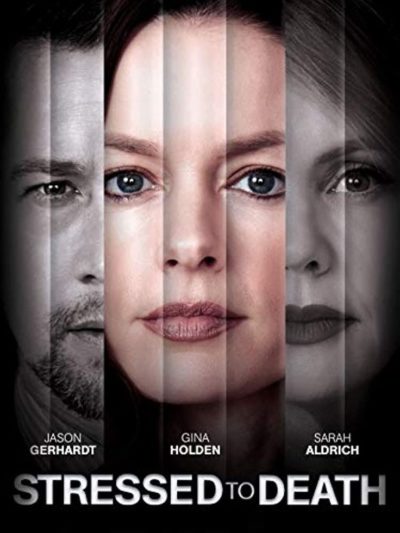 The concept here is intriguing. It’s just the execution – and the script in particular – which is bad. A robbery at a convenience store ends in the death of David, the husband to Victoria Garrett (Aldrich). She blames the paramedic on the scene, former soldier Maggie Hart (Holden), for the loss of her spouse, though the incident hits Maggie equally hard. She quits her job, raising daughter Jane (Blackwell) with her husband, commercial real-estate agent, Jason (Gerhardt). But Victoria hasn’t moved on – in probably the film’s most memorably loopy elements, she feeds her husband’s ashes to a pot-plant she calls David, to which she chats. She’s also clearly a believer in that saying about revenge being served cold.
The concept here is intriguing. It’s just the execution – and the script in particular – which is bad. A robbery at a convenience store ends in the death of David, the husband to Victoria Garrett (Aldrich). She blames the paramedic on the scene, former soldier Maggie Hart (Holden), for the loss of her spouse, though the incident hits Maggie equally hard. She quits her job, raising daughter Jane (Blackwell) with her husband, commercial real-estate agent, Jason (Gerhardt). But Victoria hasn’t moved on – in probably the film’s most memorably loopy elements, she feeds her husband’s ashes to a pot-plant she calls David, to which she chats. She’s also clearly a believer in that saying about revenge being served cold. This is not your normal action heroine film. Nor is it your normal zombie apocalypse film. While it certainly nods in both directions, it seems entirely committed to going in its own direction. My mental jury is still out on whether or not this was a good thing or not. I think if I’d perhaps been prewarned what to expect, I might have been better equipped to handle this. It takes place after the outbreak of a plague, with the dwindling number of survivors now holed up in two cities: Weimar, where infection is an immediate death sentence, and Jena, reported to be trying to research a cure.
This is not your normal action heroine film. Nor is it your normal zombie apocalypse film. While it certainly nods in both directions, it seems entirely committed to going in its own direction. My mental jury is still out on whether or not this was a good thing or not. I think if I’d perhaps been prewarned what to expect, I might have been better equipped to handle this. It takes place after the outbreak of a plague, with the dwindling number of survivors now holed up in two cities: Weimar, where infection is an immediate death sentence, and Jena, reported to be trying to research a cure. 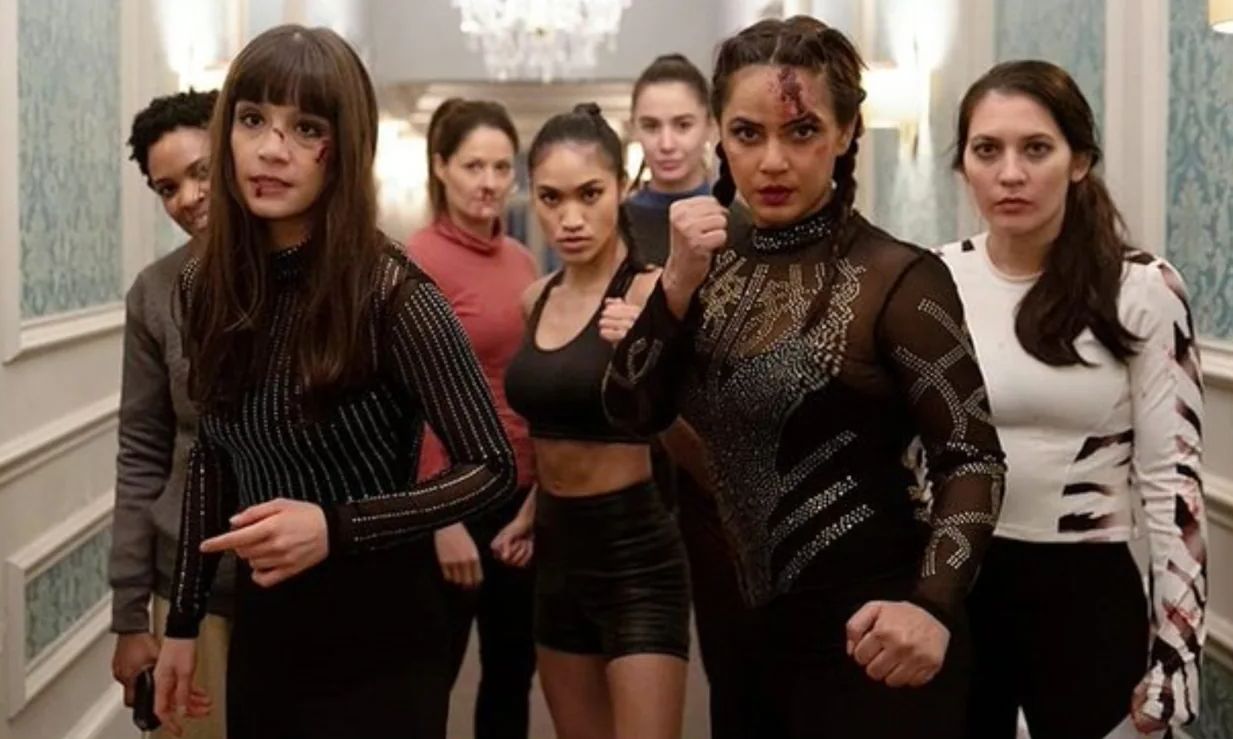 Madison isn’t without an action pedigree, having directed rather good short,
Madison isn’t without an action pedigree, having directed rather good short,  ★★★★
★★★★ Well, this was a surprise. I was not expecting too much, this being a movie released straight to Hulu or Disney+ (depending on your territory), and starring someone best known for rom-com franchise, The Kissing Booth. Actually, scratch the “too” from that sentence. I went in on the basis that I was contractually obliged to watch it, as the guy running this site. I say this, so you’ll understand how unexpected it is to be writing this: it’s the best action-heroine film of the year so far. This is just thoroughly entertaining, and as the tag-line above suggests, is as close as I’ve ever seen to a genuine, female version of the greatest action movie of all-time.
Well, this was a surprise. I was not expecting too much, this being a movie released straight to Hulu or Disney+ (depending on your territory), and starring someone best known for rom-com franchise, The Kissing Booth. Actually, scratch the “too” from that sentence. I went in on the basis that I was contractually obliged to watch it, as the guy running this site. I say this, so you’ll understand how unexpected it is to be writing this: it’s the best action-heroine film of the year so far. This is just thoroughly entertaining, and as the tag-line above suggests, is as close as I’ve ever seen to a genuine, female version of the greatest action movie of all-time.  This reaches its height in a glorious, extended sequence, with the Princess battling her way down the tower’s staircase. It feels as if it’s 20 minutes long, such is the energy contained in it. There’s even a beautiful moment of tension releasing humour, part of a running gag involving one of Julian’s minions who is too fat for all the stairs he’s ordered to climb. Nothing thereafter, including the inevitable fight against her wannabe husband, quite reaches the same heights. Glover is good value as Julian, staying just this side of a pantomime villain. As Die Hard shows, having a memorable antagonist is an important element. He’s not quite Alan Rickman – though who is? And I do have to question some of Julian’s decisions.
This reaches its height in a glorious, extended sequence, with the Princess battling her way down the tower’s staircase. It feels as if it’s 20 minutes long, such is the energy contained in it. There’s even a beautiful moment of tension releasing humour, part of a running gag involving one of Julian’s minions who is too fat for all the stairs he’s ordered to climb. Nothing thereafter, including the inevitable fight against her wannabe husband, quite reaches the same heights. Glover is good value as Julian, staying just this side of a pantomime villain. As Die Hard shows, having a memorable antagonist is an important element. He’s not quite Alan Rickman – though who is? And I do have to question some of Julian’s decisions.